Isles of Scilly: Runaway cows and visits from Beckham - life in the world's littlest league
- Published

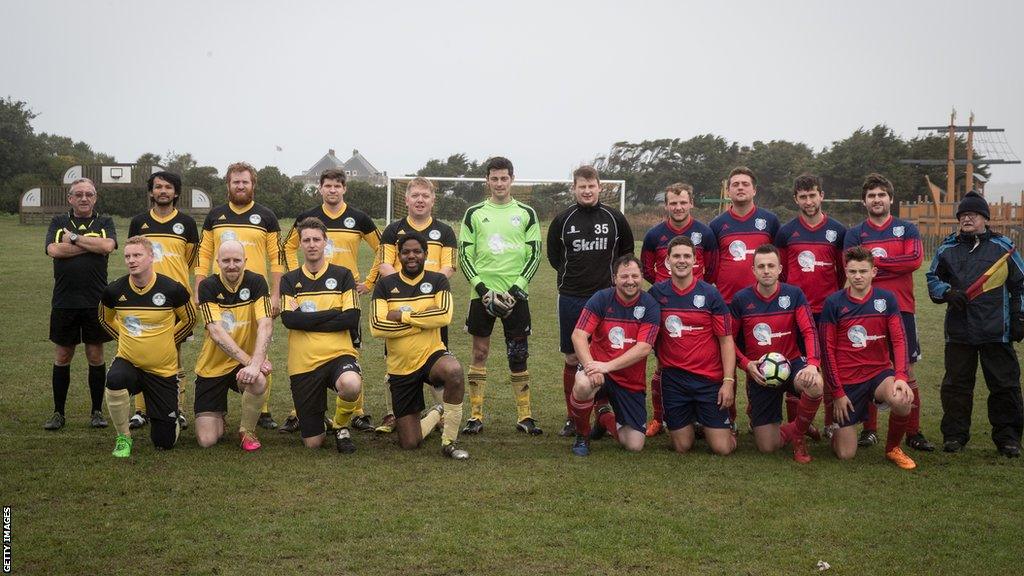
The Isles of Scilly Football League used to consist of four teams before the 1950s, but is now contested by the Woolpack Wanderers and Garrison Gunners, seen here in 2017
When Anthony Gibbons joined a Sunday morning kickabout, he didn't imagine it would lead to being David Beckham's body double.
But it turns out playing in the world's smallest league is a less predictable experience than it first appears.
The Isles of Scilly Football League consists of just two teams - the Woolpack Wanderers and Garrison Gunners. Not only do the sides face off in 18 league games each season, but they also compete in two annual cup competitions - both two-legged affairs with no away goals rule - and a Charity Shield-style exhibition.
The duopoly makes it the smallest league of its kind in the world. Technically it is an intra-club league, because both teams are registered to St Mary's, a club on the eponymously-titled island in the archipelago off the Cornish coast.
That footnote hasn't stopped global attention and a slew of star visitors though, including the day Beckham swapped Los Angeles Galaxy for the remoteness of the isles, and Gibbons swapped in to fill the former England captain's boots.
"That's my claim to fame," says Gibbons.
But being part of a uniquely familiar rivalry runs it close.

It didn't used to be like this. Before the 1950s, there were four teams vying for glory and silverware.
But an ageing, dwindling population has put the league under pressure. Between 2011 and 2021, the number of people on the Isles of Scilly fell by 6.8%., external The median age of those remaining rose from 46 to 50 years old over the same period.
Now, only the Wanderers and Gunners remain.
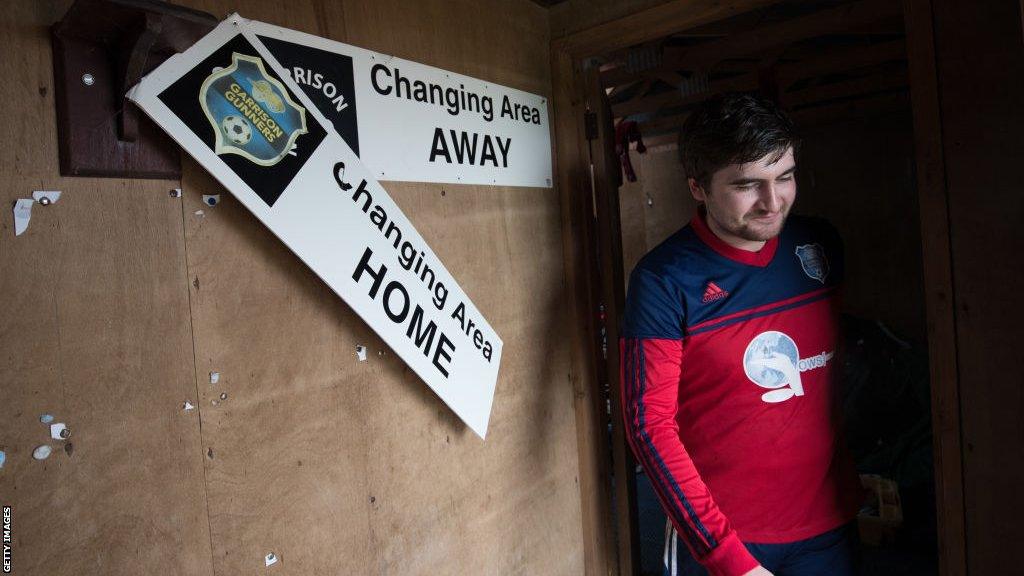
The two teams play all their matches at Garrison Field on St Mary's
Weather permitting, the two sides do battle every Sunday morning between October and Easter on the same pitch with the same players in the same kit.
"It's considered to be a bit ridiculous and like the old cliche of 'can we play you every week?'," explains Will Lethbridge, who grew up on the islands and has played in the league for several years.
"People ask if it gets a bit boring and if it's repetitive, but it's good to have a run around and it's good fun. A large number of us are friends and have known each other since school, so it's very much the social side as much as a bit of sporting competition.
"You do know certain players well, which is their favourite foot, if they like to cut in and turn, what their strengths and weaknesses are, but there have been a few slightly testy tackles too.
"There have been a few more yellow cards this year and there's the odd confrontation, so there is some competition and a bit of needle, but there are no long-standing rivalries or punch-ups or anything like that - it's all pretty much forgiven by the time the final whistle goes."
To keep things fresh, no player has a pre-ordained team at the start of every season. Instead the two captains for that year pick new squads just as schoolchildren do on the playground, taking it in turns until there are no players left. The order of the selections are kept secret to avoid letting the last picks know when they were chosen - after all, with only 2,100 residents on the islands, the league can hardly risk putting any players' noses out of joint.
Changing the sides each year mean most players have no special affinity to one of the two teams, although Lethbridge says there are some "superstitious" stalwarts who claim to perform better for one rather than the other.
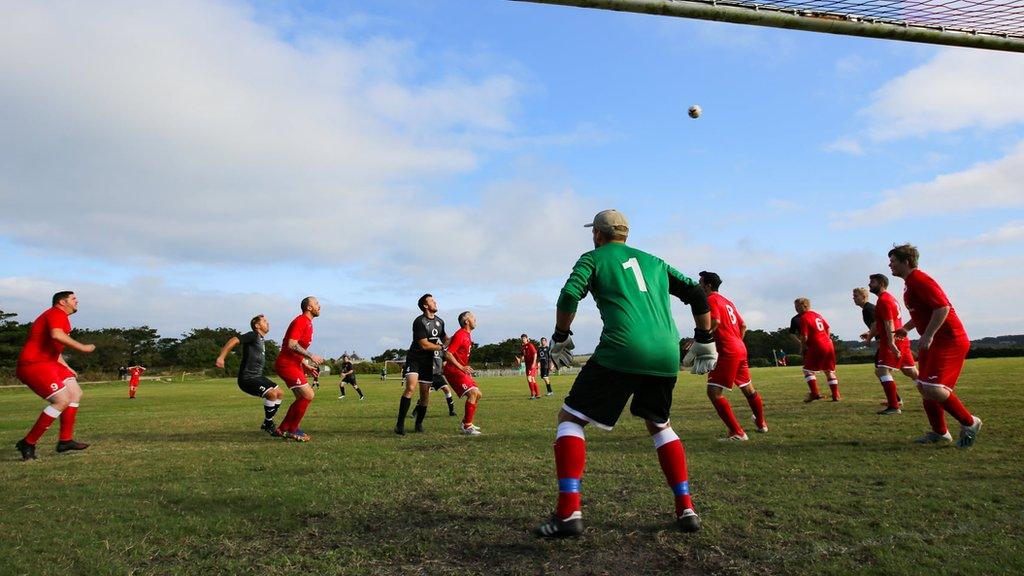
Players are assigned afresh to one of the two teams at the start of each season
The selection process is also intended to keep sporting competition equal, although that doesn't always bear out across a whole season.
"Wanderers have tended to fair a little bit better, but that's ultimately down to who the captains pick," Lethbridge says. "This year, one of the first picks for the Gunners was expecting to be here all winter and then ended up getting a job in the Swiss Alps, so they lost their marquee signing so to speak.
"It can happen, people pick up injuries and have other commitments, but it tends to balance itself out - a team goes on a winning run of two or three games, then they lose two or three games because players are unavailable. This year, though, Wanderers had pretty much wrapped up the league four or five games before the end of the season."
The formalities were concluded with a 2-0 Wanderers victory in the 14th league meeting of the season on 5 March.
Being a small island community also means that some players are called away mid-game to deal with other issues, particularly policemen or firemen who are playing while on call. Sometimes, those impromptu absences can have a big bearing on the final outcome of a match.
"There's a guy called Dave Mumford - or Chuffer - who's a farmer and a few years ago his phone started going at half time and they said 'oi, your cows have escaped', so he had to run off to find them," explains Gibbons.
"We were 2-0 up at that point and had to go down to 10 men, so we ended up losing 3-2. In the end, it turned out they weren't even his cows."
Even with the league running on two teams, it's not unusual for player unavailability to mean one-game loans are made to even up the sides. In recent years, some games have had to be postponed because there weren't enough players.
Maintaining the necessary number of players has long been a concern for the Isles of Scilly Football League, with a lack of any further education options on the islands after the age of 16 meaning many young hopefuls move to Cornwall to continue their studies just as they're ready to play.
Some people, like Lethbridge, return to the islands when they get older and bolster the ranks, while anybody of playing age that moves to Scilly is soon approached about taking part.
It can make for a wide range of ages among the players, with a handful of over 50s playing until a few years ago and one former resident still making the occasional appearance into his 70s.
"There's always a danger [of the league running out of players]," says Gibbons. "As soon as people hit 16, they go to the mainland, so we lose about six of the kids each year, but we've been quite lucky that we've got five or six more in recent years, although the year might come when we have nobody. About five or six years ago, we were struggling because we didn't have the players and only had an eight-a-side team."
If that time does arrive, it won't be the end of football on the Isles of Scilly, though. A Boxing Day match between the veterans and an under-30s team is an annual tradition, while touring teams regularly visit to test themselves against the best players from the islets.
Each September, the Mal de Mer Sporting Club, which takes its name for the French for seasickness, cross over from the mainland to go up against the locals in a multi-sport competition, including darts, gig rowing, beach volleyball and, of course, football.
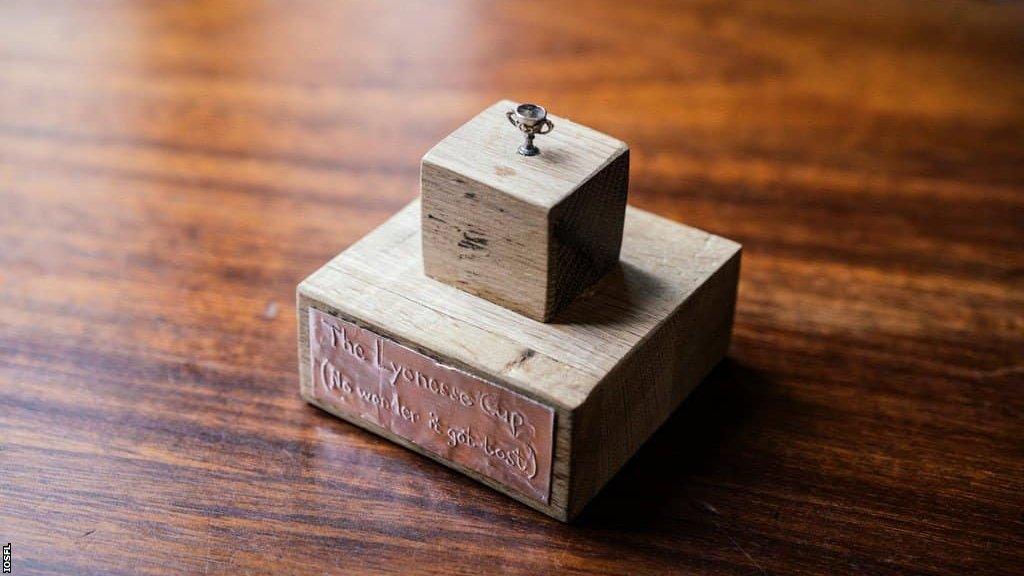
The Isles of Scilly is home to the world's smallest trophy as well as the world's smallest football league
There's also the Lyonesse Trophy, a semi-regular match against Penzance amateur side Dynamo Choughs to win what is dubbed as the world's smallest cup, measuring up at barely one centimetre tall. The novelty silverware grabbed the attention of Fifa, with the world governing body negotiating for the trophy to be displayed in its official museum in Zurich.
"We started playing Dynamo Choughs on our football tours in the early 2000s and one of their players is a metal worker, so he decided to make the smallest trophy he could," Gibbons explains.
"When Fifa came over and said it'd be great in their museum, he made a replica and they've got it at the moment. Even though it's only about one centimetre tall, people have still tried to put beer in there when they've won it, but it's not a big drink."
Gibbons and Secretary Matt Simons were treated to a VIP trip to Fifa's Zurich headquarters in February to see the cup displayed in all its glory and agree a deal to loan the Lyonesse Trophy to the museum for another five years.
Scilly's footballers are growing accustomed to the attention and regularly play host to journalists and TV crews from all over the world.
The league also captures the imagination of some of the globe's biggest brands. Vodafone used the island as the base for a 2019 advertising campaign that featured Far (Fan Assistant Referee) - a crowd-sourced 5G video review system which allowed other Isles of Scilly residents to view and vote on controversial refereeing decisions remotely.
But nothing has yet topped 2007 when sportswear manufacturer Adidas flew in a tranche of international stars as part of its Dream Big campaign.
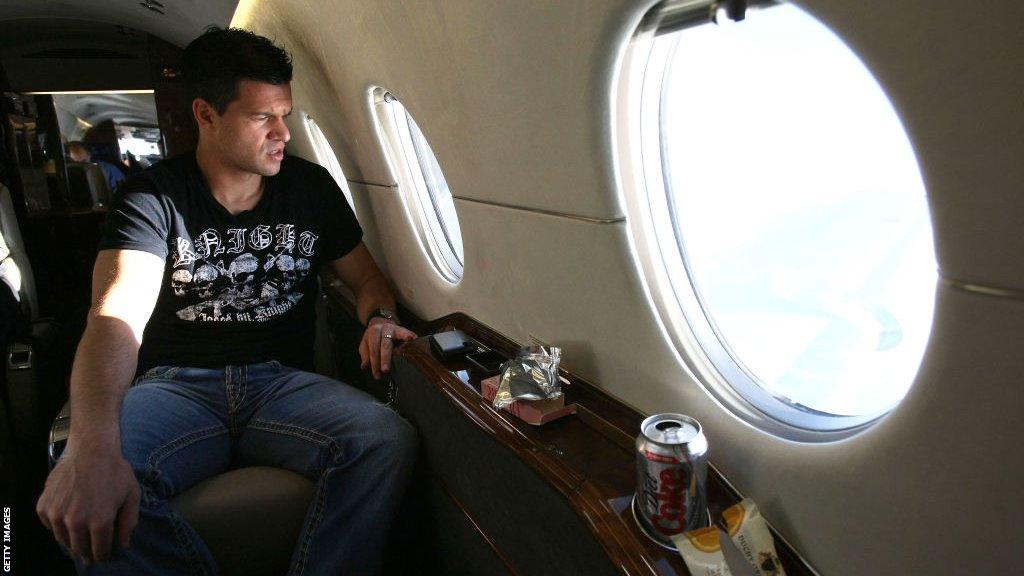
Germany and Chelsea's Michael Ballack flies into the Isles of Scilly to film an advert in 2007
Beckham, Steven Gerrard, Patrick Vieira, Anderson, Daniele de Rossi and Michael Ballack arrived on the islands to put young footballers through their paces, before relaxing on the beach and eating fish and chips.
Other, less welcome, visitors soon followed.
"A guy from St Martin's phoned the press to say Beckham was here, so a load of helicopters came over and he had to go, remembers Gibbons.
"They still needed one last shot over the bay so I filled in for Beckham."
"Someone did send a message to the production company to see if they wanted to do a revisit recently, but I don't think there's been a response," Lethbridge adds.
"We do get odd things come up and usually we'll find some time to do it because it's all good fun and it's good for Scilly because the islands rely on tourism and wanting people to come here and visit us, so any exposure helps with that."
It makes for a competition that's undeniably repetitive, but far from boring.

The dangerous rise of Andrew Tate: Enter the world of the social media personality’s multi-level marketing scheme and webcam business
The rise and fall of the jeweller-turned-criminal: Listen to Gangster: The Story of John Palmer
